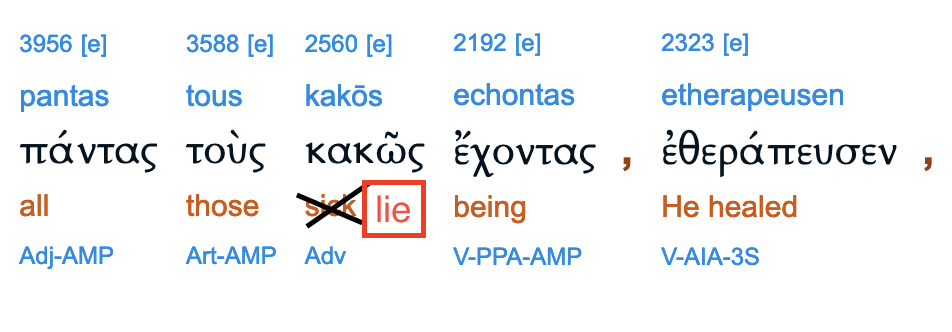Chapter 8
 Matthew 8:16
Matthew 8:16

Ὀψίας δὲ γενομένης προσήνεγκαν αὐτῷ δαιμονιζομένους πολλούς· καὶ ἐξέβαλε τὰ πνεύματα λόγῳ, καὶ πάντας τοὺς κακῶς ἔχοντας ἐθεράπευσεν·
RBT Greek Interlinear:
|
Strongs 3798
[list] Λογεῖον Perseus Opsias Ὀψίας Late Adj-GFS |
|
Strongs 1161
[list] Λογεῖον Perseus de δὲ and Conj |
|
Strongs 1096
[list] Λογεῖον Perseus genomenēs γενομένης she who has become V-APM-GFS |
|
Strongs 4374
[list] Λογεῖον Perseus prosēnenkan προσήνεγκαν they brought V-AIA-3P |
|
Strongs 846
[list] Λογεῖον Perseus autō αὐτῷ to himself PPro-DM3S |
|
Strongs 1139
[list] Λογεῖον Perseus daimonizomenous δαιμονιζομένους those who are demonized V-PPM/P-AMP |
|
Strongs 4183
[list] Λογεῖον Perseus pollous πολλούς many Adj-AMP |
|
Strongs 2532
[list] Λογεῖον Perseus kai καὶ and Conj |
|
Strongs 1544
[list] Λογεῖον Perseus exebalen ἐξέβαλεν He drove out V-AIA-3S |
|
Strongs 3588
[list] Λογεῖον Perseus ta τὰ the Art-ANP |
|
Strongs 4151
[list] Λογεῖον Perseus pneumata πνεύματα spirits N-ANP |
|
Strongs 3056
[list] Λογεῖον Perseus logō λόγῳ in word N-DMS |
|
Strongs 2532
[list] Λογεῖον Perseus kai καὶ and Conj |
|
Strongs 3956
[list] Λογεῖον Perseus pantas πάντας all Adj-AMP |
|
Strongs 3588
[list] Λογεῖον Perseus tous τοὺς the Art-AMP |
|
Strongs 2560
[list] Λογεῖον Perseus kakōs κακῶς evilly Adv |
|
Strongs 2192
[list] Λογεῖον Perseus echontas ἔχοντας those who are having V-PPA-AMP |
|
Strongs 2323
[list] Λογεῖον Perseus etherapeusen ἐθεράπευσεν had treated V-AIA-3S |
RBT Hebrew Literal:
Unclean Spirits
And of her who has become late, they brought toward himself those who are controlled by divine power multitudinous, and he drove out the Spirits by a word, and everyone of those who are evilly holding, he treated,22Julia Smith Literal 1876 Translation:
And evening being come, they brought him many possessed with evil spirits: and he east out the spirits by the word, and cured all having evils:
And evening being come, they brought him many possessed with evil spirits: and he east out the spirits by the word, and cured all having evils:
LITV Translation:
And evening having come on, they brought to Him many having been possessed by demons. And He cast out the spirits by a word, and He healed all those having illness,
And evening having come on, they brought to Him many having been possessed by demons. And He cast out the spirits by a word, and He healed all those having illness,
ESV Translation:
That evening they brought to him many who were oppressed by demons, and he cast out the spirits with a word and healed all who were sick.
That evening they brought to him many who were oppressed by demons, and he cast out the spirits with a word and healed all who were sick.
Footnotes
| 22 | Nearly all translations we have seen have changed the adverb kakos "wrongly/evilly" to the word "sick" or "ill." The word has a simple, basic meaning in all its forms:
"Sick/ill" is a gross misrepresentation of the word, and completely ignores the adverbial function. The practice was to assign a "sense" to a word as though the New Testament authors themselves gave a new sense since the true translation didn't make sense to the translators or seemed contradictory to perceived contexts/traditions. Even when such a sense is not found in Classical/secular Greek, the assumption is that the NT provides all sorts of new meanings for old words. But these "new" senses are not defined by the authors themselves, instead they are assumed by translators. |
